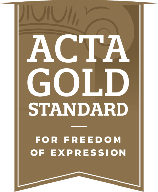
Campus Freedom Initiative™
Free expression is the necessary precondition for the unfettered search for truth on the college campus.
An ACTA Report Card on Free Expression
ACTA’s Campus Freedom Initiative™ (CFI) has evaluated universities in several states against our Gold Standard for Freedom of Expression™, a 20-point action plan for reestablishing higher education’s commitment to excellence and open inquiry. Below we present the University of Texas-Austin’s Gold Standard evaluation. UT-Austin receives credit for fourteen out of twenty Gold Standard measures. Our research highlights UT-Austin’s strengths in protecting free expression and identifies areas it must work on to improve the student experience. Explore the full University of Texas-Austin Gold Standard evaluation to learn more.
 ACTA Gold Standard for Freedom of Expression™
ACTA Gold Standard for Freedom of Expression™| COMMIT TO A CULTURE OF FREE EXPRESSION | UT—Austin |
|---|---|
| Adopt the Chicago Principles on Freedom of Expression or a similarly strong statement. | |
| Establish clear expectations regarding free expression in student and faculty handbooks and codes of conduct. | |
| Include a free expression unit in new-student orientations. | No materials showing UT–Austin meets this measure could be found. Requests to university officials for such materials remain unanswered. |
| Protect the diversity of political viewpoints by adopting an institutional neutrality policy such as the Kalven Report. | |
| FOSTER CIVIL DISCOURSE | UT—Austin |
| Sponsor campus debates that model civil discourse. | |
| Promote free expression by encouraging the establishment of student groups devoted to free expression, civil discourse, or representing a plurality of perspectives. | |
| Establish policies that protect free expression rights on campus and set clear consequences for disruption of sponsored speakers, events, and classes. | |
| Enforce policies that protect free expression rights on campus and apply clear consequences for disruption of sponsored speakers, events, and classes. | |
| Cultivate Intellectual Diversity | UT—Austin |
| Encourage presidents, provosts, and deans to model respect for a broad range of viewpoints. | Previous presidents’ statements on these issues are inconsistent. |
| Guarantee that viewpoint diversity is reflected in student life policies and practices. | |
| Support academic centers dedicated to free inquiry and intellectual diversity. | |
| Ensure faculty hiring, evaluation, and promotion processes are based on merit and make clear that the institution is open to intellectual diversity. | |
| Break Down Barriers to Free Expression | UT—Austin |
| Eliminate speech and IT policies that have a chilling effect on free expression. | UT complies with Texas SB 12, which may be ruled unconstitutional for having a chilling effect on free expression. |
| Ensure that enforcement of Title VI, Title VII, and Title IX does not infringe on free expression. | |
| Disband bias response teams. | |
| Review student government policies to ensure viewpoint neutrality in student group recognition and funding. | There is no evidence UT–Austin has discriminated against student groups based on viewpoint, but no clear statements prohibiting such discrimination could be found. |
| Advance Leadership Accountability | UT—Austin |
| Include commitments to free expression in mission statements, values statements, strategic plans, and other key institutional documents. | |
| Include a commitment to free expression as a criterion in searches and evaluations for presidents, provosts, and deans. | No statement on free expression could be found in the available leadership search profiles. |
| Require free expression and viewpoint diversity training for administrative staff. | No evidence that UT–Austin meets this measure could be found. Requests to university officials for such materials remain unanswered. |
| Conduct regular surveys or other quantitative studies of students and faculty to assess the state of free expression and intellectual diversity on campus. | UT–Austin’s current campus climate survey does not meet this measure. |
Launched in 1995, we are the only organization that works with alumni, donors, trustees, and education leaders across the United States to support liberal arts education, uphold high academic standards, safeguard the free exchange of ideas on campus, and ensure that the next generation receives an intellectually rich, high-quality college education at an affordable price.
Discover MoreSign up to receive updates on the most pressing issues facing our college campuses.